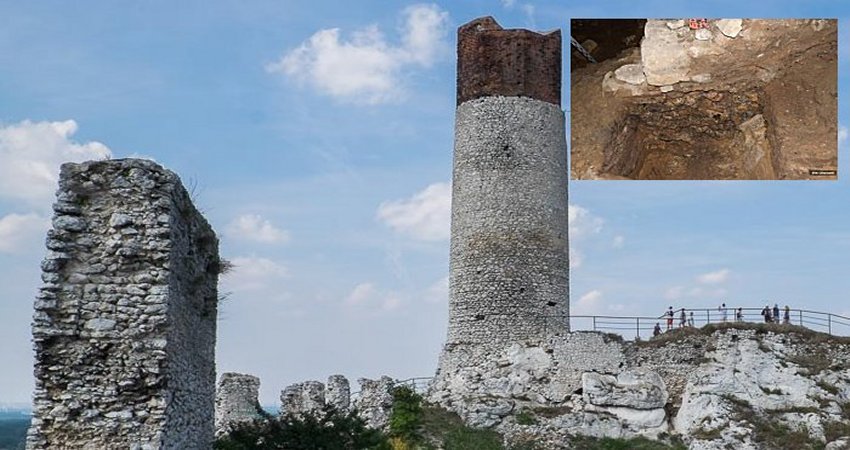Jan Bartek – MessageToEagle.com – A complex system of tunnels and crevices has been discovered by archaeologists under the castle in Olsztyn in the area of the Kraków-Częstochowa Upland.
Some of them could have been used by people in the Middle Ages, or maybe much earlier, according to excavation results.
At first, the castle in Olsztyn belonged to the bishop of Kraków Jan Muscata, and then, Casimir the Great rebuilt it, making Olsztyn a powerful fortress. Image credit: Polska Po Godzinach.pl
The castle in Olsztyn (near Częstochowa, a city in southern Poland on the Warta River) was one of the largest buildings of this type. Today, these structures (partially preserved, stone, and brick tower) are impressive ruins often visited by tourists.
The fortress is situated on different levels of a large hill. In the area of the lower castle, there is a large cave, where archaeologists are now conducting excavations.
Based on earlier archaeological data, the place was not only used as a Renaissance pantry at the castle but also served a shelter for Neanderthals, where the archaeologists discovered a large number of stone tools.
“One of the discoveries is a perfectly preserved, ornamented stove tile with the image of a horsed knight – falconer while hunting with dogs.” Image credit: M. Urbanowski
Archaeologist Dr. Mikołaj Urbanowski, who is in charge of the excavations on behalf of Nature and Man Foundation, told PAP that in the vicinity of the main cave – within the castle walls in the vestibule of the well tower – the team came across a fissure, which seems to be another large cave.
However, for now, its size and its age cannot be determined.
One of the discoveries is a perfectly preserved, ornamented stove tile with the image of a horsed knight – falconer while hunting with dogs.
In Olsztyn Castle, there are more caves, crevices, and tunnels than it was believed. Source: Częstochowa Nasze Miasto
The stove tile is one of the “It is one of the very few late-gothic plate tiles depicting the falcon hunting scene, according to the archaeologists, who believe there may be many more similar crevices or tunnels leading to other caves in the area of the castle in Olsztyn, writes PAP.
Not long ago, archaeologists discovered the tunnels located under the northern slope of the Castle Hill during research conducted before the modernization of the terraces of the Pomeranian Dukes’ Castle in Szczecin, the capital and largest city of the West Pomeranian Voivodeship, located near the Baltic Sea and the German border.
Beneath the castle, there is an extensive network of underground corridors but it is too early to say how vast they are and where they lead.
Written by Jan Bartek – MessageToEagle.com – AncientPages.com Staff Writer
Expand for referencesReferences:

